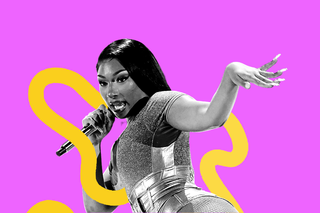
How We Loved – and Lost – the Hot Girl Summer
Capitalist cooption did what it does best — commodified Hot Girl Summer and turned it from a state of mind into an aesthetic.

When Megan Thee Stallion first coined the term ‘Hot Girl Sh*t’ in her song ‘Cash Shit’ which released in 2019, she could not have envisioned her lyric kickstarting the new crown mantra for the body positivity movement, or a cultural reset that actually made you feel good about yourself, summer or not. Hot Girl Summer is easier to visualize than describe, but I’ll try anyway. In the words of Stallion herself, “It’s about women and men being unapologetically them, just having a good-ass time, hyping up their friends, doing you. You definitely have to be a person who can be the life of the party and just a bad bitch.”
In the Summer of 2019, all it took was one tweet from her, to start a moment that reframed health, happiness, and self sufficiency as hot – unapologetically. If you deconstruct the term, hot girl summer is a largely feminine-coded term, and owes its origin to black women.
In the cultural zeitgeist, Hot Girl Summer worked, even in countries where summer is a far away dream is “because you don’t have to go anywhere, nor put yourself in harm’s way, nor ponder extraterrestrial life to have a Hot Girl Summer. You focus on your earthbound self and what it means to live your best life, in your own skin,” as per a Buzzfeed article. This phrase has now gained so much traction that Megan had to fight a two year long legal battle to trademark the term, and earn full ownership.
The internet then did to it what it does best – memefication, and co-option. Soon enough, every brand joined the bandwagon of Hot Girl Summer, with Wendy’s declaring their lemonade to be the ‘The Official Drink of Hot Girl Summer,’ and beauty brands such as Maybelline and Fenty Beauty adding their own twist to this momentum. Hot Girl Summer became the lifestyle choice not only in 2019, but the coming years as well.
But retail brands co-opting it as an attempt to ride the cultural wave had a damaging impact. It led to a conversation on brands appropriating black culture and lingo without treating black people fairly, as an article in Bitch Media notes. The cosmetic industry has not been kind to the black community, be it in terms of exclusion in skin shades, or hair products – and Wendy’s also came under fire for acts of racism in the past. The article goes on to state, “If you don’t support Black women, give them access, and make them feel seen in the products you’re peddling, then you shouldn’t adopt their intraracial phrases to line your pockets.”
Related on The Swaddle:
Why Retailers Rebranding as ‘Woke’ Is Disingenuous
Hot girl summer was less an aesthetic and more a state of mind – you don’t have to be conventionally petite and skinny, you don’t have to be a model, you don’t even have to be a girl – a ‘hot girl’ is anybody that oozes confidence and charisma, and lives their truth. In her interview with Variety, Stallion lists the rules that embody a Hot Girl, “You just have to be the life of the party, you have to be kind, you have to be confident – and you have to like try to vote!” But when brands adopted the phrase – they turned it into its antithesis. It did, inevitably, become an aesthetic – one that drew more attention to one’s body than was otherwise warranted.
The past couple years have not been great, to put it mildly. Amidst the world burning (literally), political outrages, and a persistent threat for the unseen future, summer no longer represents or celebrates the joy of life, and Hot Girl Summer is one path to some much needed respite. Hot Girl Summer owes its genesis to not only Stallion, but also those who paved the road for her, such as the Riot grrrl movement, the Girl Power movement, Spice Girls, and third wave feminist politics.
Buzzfeed goes on to describe this vision as a means to “inspire this kind of jaw-dropping awe of feminine agency — without completely forgoing men if you don’t want to. (It’s more “no boys needed” than “no boys allowed.”)”
Although this phrase has largely positive intonations, it became commodified under the aegis of body positivity, and nothing was the same again. Reclaiming body positivity is no new phenomenon, and despite the repetitive chants of ‘Hot(ness) is a mindset,’ summer remains intrinsically linked to bikini bodies, summer shredding, and conventionally attractive body types – perhaps even more so today, in the age of Ozempic. When brands co-opt this mantra to promote diet culture under the guise of ‘fitness’, the momentum of the movement shifts.
Michelle Carroll, in her fitness blog, speaks of how “during the summer, advertising is directed at getting you “ready” for summer, through cosmetic procedures, cellulite-reducing creams, spray tans, gyms, fat-burners, laser hair removal. In essence, they control your environment. By surrounding your physical and virtual world with reminders that you still have work to do before you even dream of setting foot outside in the summer months, you are more likely to spend, spend, spend! Capitalism does not care for body image.” These tactics get the brands their desired exposure, but ultimately contribute to a debilitating body image.
A study conducted by Scott Griffiths et al reported on the fluctuations seen in body image through the seasons. As hypothesized, in summer they observed peaks for body dissatisfaction alongside peaks in four proposed seasonal body image mechanisms: pressure from media advertisements, pressure from peers on social media, the feeling that one’s body is on public display, and appearance comparisons.
The beauty and fashion industry ruthlessly capitalizes on our insecurities and anxieties, and at the end of the day, a movement targeted towards upliftment and inclusivity, ended up doing nothing but putting us down again. Hot Girl Summer was for everyone – now, against the spirit of its origins, it’s back to residing in billboards and perfect Instagram ads.
Hetvi is an enthusiast of pop culture and all things literary. Her writing is at the convergence of gender, economics, technology and cultural criticism. You can find her at @hetviii.k.
Related


Woe Is Me! “My Friends Have Bigoted Views. Can I Change Them?”
